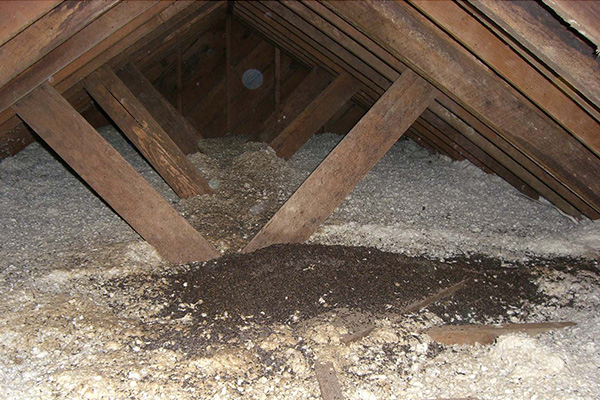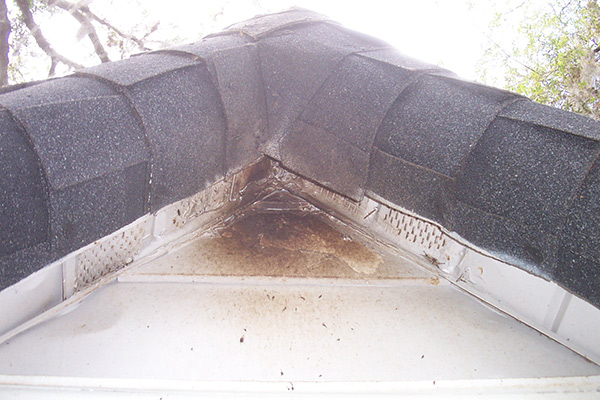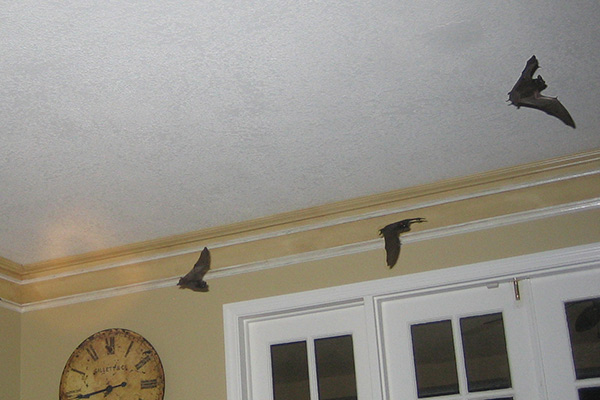- info@animalatticpest.com
- Call - we service 300 locations

Damage Caused By Bats in the Attic
Bats can cause considerable damage in the attic. But not always. It depends on many factors, such as the length of time the bats have been in the attic, and the number of bats. Bats are good animals, gentle and beneficial to the environment. They eat a lot of insects, which people seem to like. The only real problem with a colony of bats in the attic is that each bat poops 20-30 times per day (they eat a lot!) and you can do the math. 25 fecal pellets x 365 days = over 9000 bat poops per year per bat. If you have a large colony, the droppings can accumulate. I have personally been inside attics which were loaded with feces over two feet deep throughout the attic, causing the ceilings to cave in. The odor of a colony of bats and their guano can be very strong, and in accumulation, the guano can be a health risk - a place for mold to grow, and can cause potential respiratory infections. For these reasons, many people want to remove the bats in the attic before the problem gets out of hand. Don't touch them! Waste left behind can also encourage the growth of mold, attract bugs like cockroaches, and contains a scent that will encourage new bats to enter the attic in the future.
Photographs of Bat Damage in the Attic
Feces in the Attic
Here is a photo of typical bat damage - you can some piles of bat feces below the roosting areas. Much of the feces is out of sight in eaves or walls.
Feces on the Roof
This isn't damage inside the attic, but the bats in your building will spread feces all over the roof and walls outside. Not really a big deal.
Odor Issues
Bat feces, urine, brown fur grease (pictured above) and the bats themselves have a very distinct, pungent odor that most people don't like.
Information About Bat Damage in the Attic
What kind of damage do bats cause in an attic? Bats are some of the most destructive attic-inhabiting creatures in the USA, if in large quantities. Because they roost by hanging from the ceiling of cave, building, or your attic they
will just drop their waste down below without concern for the mess they are leaving. That waste often contains parasites and disease that can be dangerous for you and your family.
This may make many wonder what kind of damage a bat can cause in your attic. The truth is that it can do a significant amount of damage if given the opportunity.
It is the disease and parasites that comes from the waste that is the primary damage that bats can cause. First, starting with the waste, understand that this will cause permanent discoloration and can lead to bacteria and mildew
becoming ingrained in the wood of your home. This can make a permanent health risk for sure.
This is the true of the fiber glass in your attic as well. Wherever this waste drops has to be thrown away immediately, as well as about three or four feet from the affected area. While the waste may not have directly landed on
this area it does not mean that it is not contaminated. Therefore, for the safety of you and your family, you must get rid of this insulation to keep things safe in your home.
Now onto the parasite problem, a Bat feces, or guano, turn to dust when it is touched. This is true even if it is touched by small critters like mice or rats. When this occur the dust particles instantly become airborne. That
means that parasites and disease are spreading all throughout the area of your attic.
These parasites are incredibly dangerous to your health. Many cause severe respiratory and digestive problems, and can even lead to death. This means that your attic can instantly become a breeding ground for diseases that can
endanger not only you and your family, but your pets as well.
One of the major problems of these parasites is that they are able to survive for quite an extensive period without a host. So even if they are just laying on the floor of your home for a few weeks they can still cause a health issue.
Bats will not really scratch and claw at materials in your attic, meaning they will not destroy boards, wiring and siding. They have rather sharp teeth, but they are for catching insects, so prolonged periods of them living in your attic will not leave long lasting structural damage in your home
due to scratching or chewing. Read about Do bats chew on electric wires in the attic? They don't chew, but the weight of guano accumulation can certainly collapse drywall or sheetrock ceilings.
Other bat information:
Bats in a tile roof: risks and removal process
What to do after a bat bite: risks and treatment
Bat Bugs: Risks and Removal
Bat Calendar: One Year in the Life of a Bat
Bat Hibernation: When, Where, How Long?
Bat Migration: Where Do Bats Go In Winter?
Do Bats Like Light at Night? Do They Like Light or Dark?
How Do Bats Find and Drink Water?
How many bugs can a bat eat each night?
What does a group of bats in your house sound like?
Bats on the ground: do bats walk or even touch the ground?




